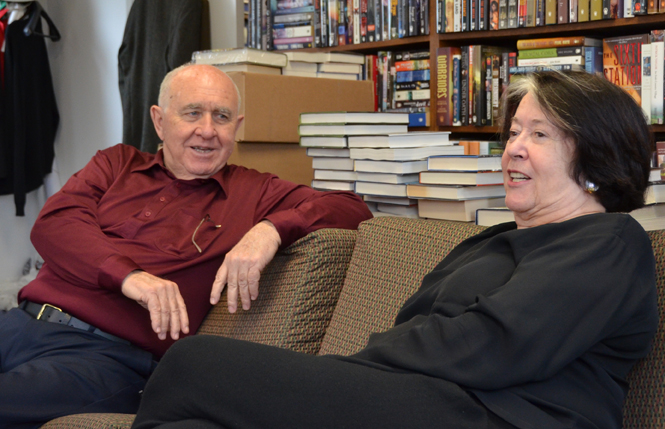Who better to interview a living legend than another living legend? “Talking with Tom” is the second installment of a new Tor.com series in which Tor publisher Tom Doherty chats with one of the many authors and industry icons whose careers he helped launch and shape.
Please enjoy this fascinating and wide-ranging conversation between Tom Doherty and Harriet McDougal, who collaborated for decades on many iconic science fiction and fantasy titles, including of course every novel in The Wheel of Time series. Tom and Harriet discussed Harriet’s work as an editor, her late husband’s career (including information about an as-yet unpublished fantasy novel by Jordan), the Wheel of Time’s famous artwork, and of course the recently released final installment in the series, A Memory of Light. Also present was Irene Gallo, Art Director for Tor Books.
***
DOHERTY: It’s kind of neat sitting here in this office, looking across Madison Square at the building where we first worked together at Tempo, back in the olden days, 1970. We started together there. I was Publisher, Harriet was Editor-in-Chief, and we had a lot of fun. We began doing fantasy and science fiction in that line, and Harriet was of course the one doing it. We did so well that Grosset bought [SFF imprint] Ace for us to play with. Harriet became the editorial director of Ace, and we experienced tremendous growth there.
McDOUGAL: Tremendous growth. I remember when you went to your first science fiction convention, all happy you had a nice company, planning to do wonders for science fiction—as in fact you have. When you said hello to the first people you saw in the lobby, they stood up and said: “Hi, we’re the Science Fiction Writers of America grievance committee, and we’re going to audit your books.”
DOHERTY: Oh, I remember that so well.
McDOUGAL: I think you came up clean.
DOHERTY: Actually, we did come up clean. We’d just bought Ace that week. We were behind because Ace was behind. Our editor in charge of science fiction back then, Pat LoBrutto, understated the situation. He said to me: “You know, we’ve got a little bit of an image problem. It would really help if you would come out to the World Science Fiction Convention.” It was in Kansas City, so I said, “Sure, Pat, if it’ll help, obviously, I’ll come.”
As soon as we came in, these two guys recognized Pat. They didn’t recognize me yet. One of them said: “I’m Andy Offutt, I’m president of the Science Fiction Writers of America.” The other one said, in a very loud voice: “And I’m Jerry Pournelle. I’m chair of the grievance committee, and we want to audit your books.”
Well, Jerry had been in the field artillery. His hearing was bad, and he talked loud enough to hear himself. That meant everybody in the whole lobby could hear. Everyone kind of turned en masse to look at us. One person in the group of fans pointed at me and said: “That must be Ace. They’re the people who screwed Andre Norton.”
Now, we loved Andre Norton. Harriet had already bought her books at Tempo. We had published her there. But Ace had been in financial trouble, and they were behind on their royalties. What a way to be introduced to the World Science Fiction Convention.
McDOUGAL: I was so glad I wasn’t there.
DOHERTY: I came home and went to Grosset immediately. I said “Boy, the first thing we do is pay all these royalties,” and we did. That kind of annoyed Jerry Pournelle, because by the time he got there and did his audit, we didn’t owe him anything, so he couldn’t charge us for the cost of the audit. It’s a long time ago, and Jerry may remember it a little differently, but I remember it pretty clearly, and that’s how I remember it.
McDOUGAL: It was an interesting time.
opens in a new window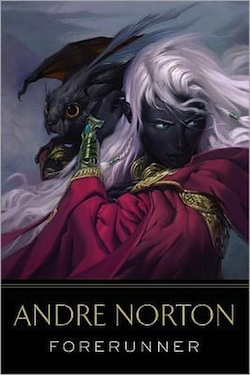 DOHERTY: The very first book we published at Tor was actually Forerunner by Andre Norton.
DOHERTY: The very first book we published at Tor was actually Forerunner by Andre Norton.
McDOUGAL: You went to Florida and said: “Please, I’ve never asked you for a favor, but I want one now.”
DOHERTY: It was neat, because Harriet was quite into woman’s rights. She got a real kick out of the fact that, in the science fiction field that was so heavily male in those days, the first Tor book was by a woman.
GALLO: I never thought of that. That’s great.
McDOUGAL: Even though she was deep in purdah writing as Andre. But she had first published at the age of, what was it, seventeen? Very early.
DOHERTY: I looked it up later. Her first book was published in 1934, the year before I was born. She was great. She was a lovely person and a lovely storyteller. Of course, by the time of Forerunner everybody knew she was a woman, but I guess back in 1934 when she was starting to get published, they just didn’t think women wrote science fiction.
***
After this brief discussion of Tor’s early days, the conversation turned to Harriet McDougal’s work as the editorial director of Tor Books. Read on to find about another legendary SF novel she edited, and a former secretary who later became famous in his own right.
McDOUGAL: Tom and I were just discussing yesterday that we were doing “telecommuting” before it was even a term.
DOHERTY: She was the first one.
McDOUGAL: I had already moved back to Charleston when he was starting Tor. He asked me if I would be the editorial director. He said: “I’m not asking you to move back, I’m just asking you to edit.” And I said okay.
DOHERTY: She’s the best editor I’ve ever worked with.
McDOUGAL: Oh, thank you.
DOHERTY: You know, I’ve worked with a lot of them, as Publisher, as Vice President of Sales at Simon and Schuster, at Grosset and Dunlap. Harriet’s the best. I just couldn’t do without her and, you know, just because she was in Charleston wasn’t going to stop us from working together.
McDOUGAL: Well, thank you, Tom. A week ago in Provo [at the first A Memory of Light signing event on January 8th, 2013] I walked into the high school auditorium where everybody was gathered for a pre?event, before the book went on sale at Midnight. [Dragonmount.com Founder] Jason Denzel introduced me in lavish terms, using words like “wonderful.” The crowd, which was wall?to?wall, gave me a standing ovation and moved me almost to the point of tears. They just weren’t stopping. I began speaking over them and said: “Thank you very much. Thank you for the lovely introduction, Jason, but I don’t think all those words are true. I’m here to tell you I put on my shoes one foot at a time, just the way you do.” I actually got them to sit down.
DOHERTY: Just to comment apropos of what I was saying earlier about this talented lady: we just got the Indie bestseller list in. Robert Jordan’s A Memory of Light is number one, okay? But another book Harriet acquired, Ender’s Game, is number seven on the mass market list. This novel was published in ’85. Now, how many books from ’85 are in the top ten bestsellers?
McDOUGAL: This is a year for Ender’s Game if ever I saw one.
DOHERTY: Well, we’re ahead of publicity. It’s just starting. It’s on the bestseller list now. It was last year too. Seventeen times, if you count the extended bestseller list of the Times.
McDOUGAL: Wow, that’s amazing.
DOHERTY: Yeah. And Harriet’s mentioned in the novel’s acknowledgments. Scott [Orson Scott Card] talks about what a great editor she is, too. So there are other people with exactly the same opinion.
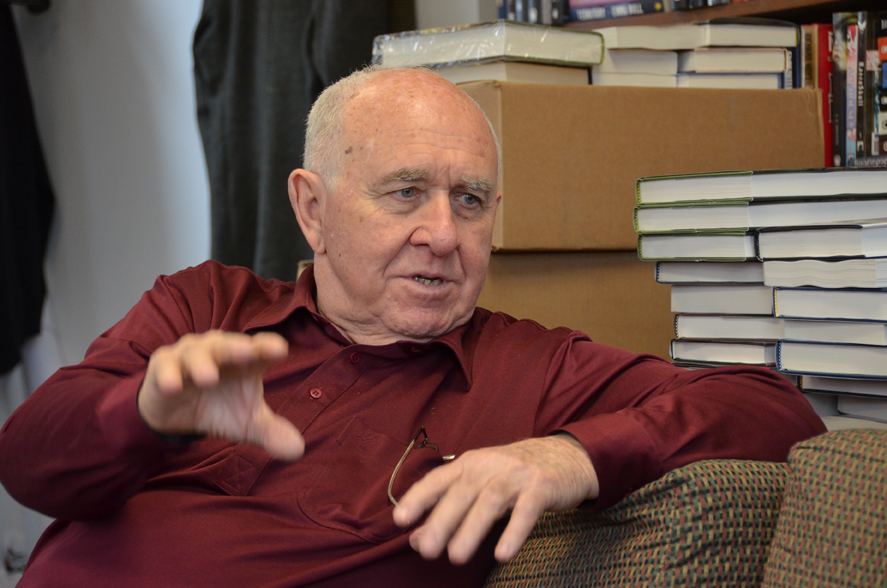
McDOUGAL: Back at Tempo, I had a wonderful secretary. He had interviewed with Tom, who sent him down to me. Tom was planning to hire him, but he wanted to be sure I could work with him. Once I interviewed him, I called Tom to say I wanted him.
He was a guy named Howard Ashman. He later went on to write Little Shop of Horrors and The Little Mermaid and Beauty and the Beast. He was just wonderful. While he was with Tempo, he did a little series of fairy stories that had black?and?white outline drawings every other page. You could paint them with water and vague colors would come up.
Howard cut his teeth on retelling fairy tales with those little things. He had a background in children’s theater, which he’d done in Baltimore. I later ran into him at Pinnacle when Tor had just barely started. All of a sudden there was Howard, spreading out galleys on the floor. He was eking out a dreadful living doing freelance proofreading. He showed me some lyrics for the show he was working on, and that was “Someplace That’s Green.” I said: “Howard, I don’t know lyrics, but it looks okay to me.” He was a special feature of those days, just a wonderful guy.
And I couldn’t get him a raise. Grosset wouldn’t ante up a raise for him, and he quit. I asked him to come for a walk and said: “I’m so sorry. Please, stay another two months and I’ll get you the money.” And he said: “Harriet, no. If I had the money I would just buy a sofa, and then I’d be in trouble. It’s time for me to go and chase the theater.” And so he did.
DOHERTY: I never heard that story.
McDOUGAL: Well, he’d been waiting six months for that raise. Jim Frenkel was also editing under my direction at Tempo at that time. I could not seem to get them the bonuses they deserved. So I decided, all right, I was getting a bonus, I’d split it with them. In late January I called them into the office and said: “I couldn’t get you bonuses, but I am going to split my bonus with you. Here it is.” I opened it in front of them, but it was the withholding. One of my numerous times of making a fool of myself. But I did split the bonus with them when I finally got it, because they were great. Starting Tor was one dickens of an adventure.
DOHERTY: Another great—and profitable—thing Harriet did for us was cartoons. She brought some great cartoons over to Tempo. In 1980, the very first year, we wouldn’t actually have shipped any books, because it takes a while to get things organized and written. We’d just started incorporating late in ’79. To get books out in 1980 would have been a challenge, but King Features had two movies that year: Flash Gordon and Popeye. We hadn’t come up with the Tor imprint yet, but we rushed out tie?ins for those movies, both in comic form and in novelization.
McDOUGAL: Harum?scarum. Conan with one hand and Popeye with the other. As the years went by, Tor grew and grew and grew. From my point of view, there came a year when Jim [James Oliver Rigney Jr., AKA Robert Jordan] was beginning to make some real money. I was commuting up to Tor for one week a month, every month. I had a TRS-80 machine with tape storage, and it would record the entire inventory of Tor books so nicely, but then I could never unload it when I got up here. It was a pretty miserable system. Then there came a year where I thought: “This is the year I could either add a third stress medication, or I could stop being editorial director of Tor.” It was time to do that.
DOHERTY: I hated every time she ever cut back. I understood, but I didn’t like it.
McDOUGAL: Well, I was doing a lot of editing. Heather Wood told me once, when she was working here, that I was editing a quarter of the hardcover list, which meant I was also handling a quarter of the paperback list because of the previous releases. It was a lot. But it was a great ride.
DOHERTY [To Gallo]: That was her problem for doing the best books.
McDOUGAL: I don’t know about that. But I loved working with Michael and Kathy Gear, Father Greeley, Carol Nelson Douglas. All manner of creature. Lots and lots of them.
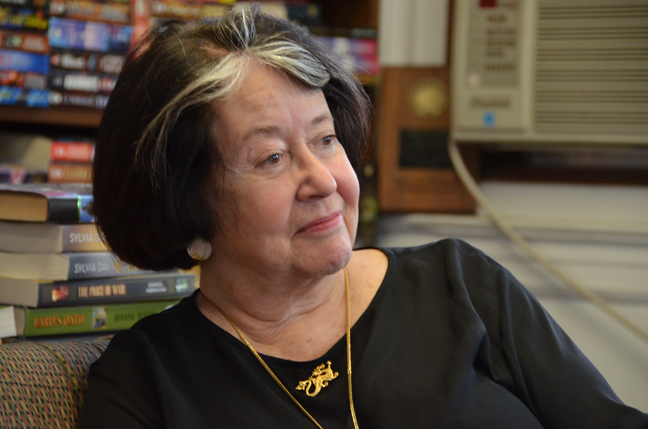
DOHERTY: Yeah. Andy [Greeley]’s books used to make the bestseller list back when you were editing him. That was fun. He came to us first with science fiction, right? Then we did a fantasy, with your editing. He loved your editing. We ended up doing all of his books.
McDOUGAL: I really loved working with him.
DOHERTY: You must have some stories like mine about Jerry Pournelle. What kind of crazy things happened to you in your early days? You were editing Fred Saberhagen, David Drake, people like that.
McDOUGAL: They were just great to work with. Nobody was yelling and screaming down the phone at me.
DOHERTY: Fred’s Swords, the first three Books of Swords were bestsellers for us, too.
McDOUGAL: They were good. I used to tease Fred about his day job as a pitcher in the professional baseball world. I think he’d heard that maybe too many times. “There was a Saberhagen pitching.” “Saberhagen pitches shutout” and so on.
***
At this point, Harriet and Tom began discussing Robert Jordan’s earliest published works: the historical Fallon novels.
DOHERTY: The first Robert Jordan novel Harriet published personally, we did as a joint venture under the imprint and the company Popham Press. Popham is her maiden name.
McDOUGAL: Well, it was distributed by Ace.
DOHERTY: It was distributed by it, yes. I was Publisher of Ace at the time.
GALLO: What was the title of that book?
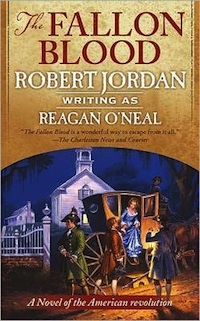 McDOUGAL: His first published book is called The Fallon Blood. It’s a novel that covers the American Revolution in the South. At the time, I thought: “If I have to look at one more book about the Civil War, I’ll just throw up. I’ve had it with crinoline. There are too many. Margaret Mitchell did it once and for all. Let’s go for the Revolution instead.” So he did—the revolution in Charleston, South Carolina, in particular.
McDOUGAL: His first published book is called The Fallon Blood. It’s a novel that covers the American Revolution in the South. At the time, I thought: “If I have to look at one more book about the Civil War, I’ll just throw up. I’ve had it with crinoline. There are too many. Margaret Mitchell did it once and for all. Let’s go for the Revolution instead.” So he did—the revolution in Charleston, South Carolina, in particular.
He followed that with The Fallon Pride, which covered the War of 1812, and The Fallon Legacy, which took the Fallons into the brand new Republic of Texas. At that point distribution dried up, otherwise he could have just gone on. He had a dream in which a man is holding Michael Fallon’s sword, standing next to the grave of the Fallon who has died in the Vietnam conflict, and I thought, oh, boy. Anyway, with those books he wanted to write the Southern sweep of American history, in the way that John Jakes wrote the Northern sweep. Taking people across the continent. And they were good.
DOHERTY: They were.
McDOUGAL: I would like to the point out something to the fans. Every single book Robert Jordan wrote begins with the wind. “The English wind blew the dust into Michael Fallon’s face on his Irish road.” That was the beginning of The Fallon Blood. The Fallon Pride begins, “The August winds scorched across Tripoli harbor.” There is always a wind. I think it was very conscious that he was breathing life into his characters. Breath and wind have the same root, I think, at least in Hebrew.
GALLO: That’s wonderful.
***
After the three Fallon novels, Robert Jordan fantasy career took off with the Conan novels, but before those he’d written a manuscript entitled Warriors of the Altaii.
DOHERTY: By the time he was working on The Fallon Pride, he had already said to me and you both that he wanted to write a great epic fantasy.
McDOUGAL: Yep. He wanted to write everything. I remember you called and you’d gotten the rights from Conan Properties to do a Conan novel, but you wanted it in time for the first Conan movie. Not that it would be connected to the movie, but obviously to get a ride on it.
DOHERTY: Yeah.
McDOUGAL: Jim Baen was working with us at the time. I said: “Why don’t you ask Baen?” Jim said: “Baen doesn’t like muscular fantasy, that’s why.” I remembered the first thing of Jim/Robert Jordan’s that I ever saw, a manuscript called Warriors of the Altaii, which has still not been published. I think four or five contracts came out of that manuscript, including my own contract. A first novel is so dangerous because so many people start novels and never finish them, but I saw that he could indeed finish something. It was pretty muscular fantasy. I don’t remember anything about it except the hero is shackled to a stone wall in a prison cell. The stone floor rumbles open and great tentacles emerge from it at the end of the chapter.
So I asked him about the Conan novel, and he said no. Three weeks later Doherty hadn’t given up, and he called me and said: “I can’t think who else would do.” I went back to Jim and said please, and he finally said he’d do it. And then he liked it so much that he did six more.
DOHERTY: He cut his teeth on those.
McDOUGAL: And then, after he stopped writing them, he edited a bunch of Conans. Once he had to take a plane somewhere and said: “Harriet, I forgot to write the sales copy for Conan the Whatever?It?Was”, so I ended up having to write it, about Conan up against the thieving little wazir. I read as few pages as possible, you know, to get the hang of that thing. The sell line ended up being “Sell that Conan down, boys. Turn that Conan round. Rack that Conan round.”
DOHERTY: Those Conan books were fun, though. I never read his first novel [Warriors of the Altaii], but if it was like the Conan books, why didn’t we ever publish it?
McDOUGAL: Well, because I sent it to [Jim] Baen at Ace. Baen bought it for Ace, so it was sold. But then he left Ace, and Susan Allison came in, and she didn’t like it. Finally, after about a year he wrote her or called her and said: “Would you like me to do some stuff on it?” I don’t know what she said, but Jim said, it’s the women, and she said I’m so glad you understand. “Tell me what you want me to change and I’ll be glad to do it.”—another year goes by and nothing happens. I said: “Honey, I think you need to ask for the rights back.” He did, and she gave him the rights back.
So, that manuscript got him a contract with me. It got him a contract with Ace. Before we ever met, he’d originally sent it to Donald Wollheim at DAW, who sent him a long single?space letter with no margins, obviously written at home. Jim had been taking a course in business law of some kind, because he knew he wanted to write, so he wrote back and said: “Thank you so much, Mr. Wollheim, but I wondered if I could have a little more? Five percent of the movie rights?” Or maybe it was the foreign rights. Wollheim wrote him a one?line letter back: “In view of your contract attitude, I withdraw my offer.” So that’s three contracts this book has given him.
DOHERTY: But we didn’t publish The Eye of the World until 1990, so why didn’t we ever do Warriors of the Altaii? It would have seemed a natural fit while he was doing the Conans.
McDOUGAL: I don’t know. We never thought of it. We were busy. I guess I’m embarrassed to say I think it maybe was sort of like a John Norman novel… not something you’d really want to build a career on.
Warriors of the Altaii needed a lot of work. At one point he decided it needed a rewrite, and I said: “Just don’t.” But old Warriors glows with a strange green light. All those contracts came slurping out of that book. It’s the book that made me give him the historical contract. It had a beginning, a middle, and an end. He could follow through. And he was a wild bird.
***
Harriet and Tom also talked about the original contract for The Wheel of Time, which was signed years before the first novel would be published in 1990…
DOHERTY: I think he’d only actually written two Conans when he decided to write The Wheel of Time. We talked about it a lot in ’83. I remember talking about it quite a bit before we did the contract in ‘84. I thought The Fallon Blood was going to be a standalone and that there was only going to be the one book on the Southern sweep of history. It ended up being three. We began talking about an epic fantasy: one book, then maybe three books like The Lord of the Rings. I just didn’t believe it would get done in three books, because by then I knew how Jim liked to tell a story. So we did the contract in early ’84. He was doing Conan books well beyond when we began talking about that in ’83. When did the first Conan book ship? ’81?
McDOUGAL: Oh, I don’t remember. Maybe the movie you were hoping to plan your timing around was the second Conan movie?
DOHERTY: I think it was. I think it was later because we were already pretty far along in the planning of The Wheel of Time, and this was related. It just seemed natural for him to be doing that, too.
***
A few years later, The Wheel of Time launched and became a genre-defining, bestselling series. Tom, Harriet and Irene Gallo discussed the early days—and the crazy production schedules….
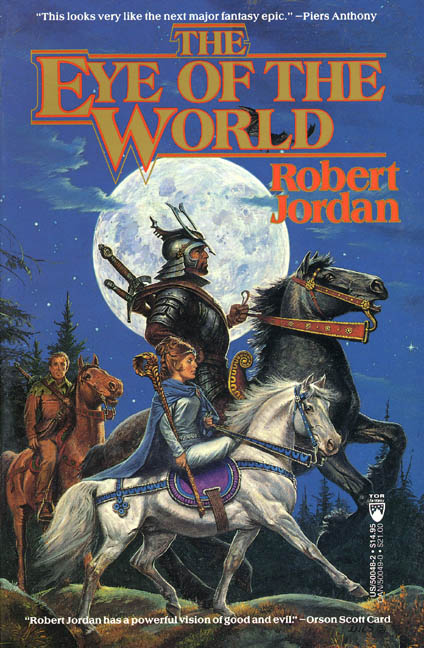 DOHERTY: I like the Fallon books. I like the Conans he wrote. But when I read The Eye of the World, I just thought, boy, this is just wonderful. This is special.
DOHERTY: I like the Fallon books. I like the Conans he wrote. But when I read The Eye of the World, I just thought, boy, this is just wonderful. This is special.
McDOUGAL: Yeah.
DOHERTY: Harriet and I decided we were going to make this a bestseller. We did it in trade paper because we were afraid we couldn’t get enough out of a fat hardcover book. Trade paper wasn’t anywhere near as big then as it is now, but we thought that’s good, too, because it will call attention to itself. It’ll be different. So we did it in trade paper and sold 40,000 copies, which was huge for trade paper in those days, for the first of a fantasy series.
McDOUGAL: When I called you the first time, I was about halfway through reading the partials Jim was handing me. I said: “Tom, you got to read this one.” He said: “Yeah, why?” [To Gallo] You know Tom. I replied: “Because either I’ve fallen into the wife trap after seven years of marriage, or this book is wonderful.” I sent it to Tom, and you didn’t just go the whole hog, you did the whole hog and all the piglets. A truly magnificent job of publishing.
DOHERTY: Oh, we had so much fun with that. You know, it’s funny. People think that, when you get a success like that, you don’t want to mess with it. The second book doubled the sales of the first in trade paper. So when we got to the third book, we decided to do it in hardcover, and sales just screamed. People asked: “Why would you do that? Look how wonderfully it’s growing where it is.” And that was our first book to hit the bestseller list.
GALLO: Really?
DOHERTY: Yeah, it hit the New York Times, not high up, but it did. And from then on, always up. How about you, Irene? You’ve been working on the covers for a lot of years.
GALLO: It’s hard to say. I came on in ’93, when Maria [Mellili, former Art Director for Tor Books] was here. It was already the big book of the year. Many of the cover decisions were set. My earliest memories were that the production schedules were set by hours, not days.
McDOUGAL: Really?
GALLO: There would always be four different versions of the production schedule, based on what day it came in. Contingency plans on top of contingency plans.
McDOUGAL: For one of the books, Jim and I stayed at the Murray Hill Hotel, with twin laptops. He’d do a chapter and give it to me, I’d read and edit it, and then I’d bring a disk in. I had a terrific carryall I’d bought at the Morgan Library, but it was not up to carrying my laptop and gave up the ghost in the middle. That was, I think, the craziest.
GALLO: I remember Jeff Dreyfus, our production manager at the time, spent the days walking back and forth from the office to the hotel.
McDOUGAL: And Jim ended up having to stay up here to proofread. It was going to take a week or more, and I had to go back and deal with stuff at home. That’s funny about the production schedules by hour, though. I’d never heard that.
GALLO: They would set up four of them: if it comes on Monday, it’s this, but if it comes in late Tuesday, it’s this.
DOHERTY: But hey, you know, it worked. We did a book each year, and each book built. By the time we got to the fourth book, we were selling the first book in mass market paperback. It was hooking people and bringing them in. Then the next book would grow, because people wouldn’t want to wait.
Let’s talk about windowing. [Note: Windowing is the term used for spacing out the release dates of different formats of a book. Hardcover followed by trade or ebook, etc.] Harriet windowed this book, and there’s a lot of misunderstanding about this. People think that we did it for some selfish reason.
McDOUGAL: No, it wasn’t a selfish reason. The brick?and?mortar bookstores were very good to Robert Jordan throughout his career. They are having a hard time now. This was a chance for Robert Jordan to give back to people who had been very good to him for 20 years. That was really the main reason for the windowing.
When I began in this business, which was when dinosaurs roamed the earth, a hardcover would come out and you had to wait a year or more for a cheaper edition to come out. Even now it’s generally more than six months for a paperback to come out after the hardcover. In that context, a window of three months doesn’t seem very onerous. It’s a way of holding out a hand to the bookstores, where you can have book signings and meet other people who like books and, above all, where you can browse. It’s very difficult to browse on the Internet. It’s fine when you know exactly what book you want, but how can you have your eye caught by something in the next aisle that you’d never considered, like maybe a book called Knit for Dummies. “What’s that? I want to go look at that.”
DOHERTY: It’s so true. We grew up selling books this way. Sure, there’s a new, wonderful way to reach more people, but we shouldn’t ignore all the things that booksellers have done for us all these years. I understand Harriet’s feelings, and I think it’s wonderful that she cares and wants to support the people who supported us over fourteen books.
McDOUGAL: And all the people who found it because they thought: “Gee, that cover looks interesting.” Well, when you’re online that opportunity doesn’t quite exist in the same way.
DOHERTY: No, you’ve got to look at too many things. You can’t see it by accident, out of the corner of your eye as you walk around.
McDOUGAL: Exactly.
DOHERTY: A Memory of Light was the biggest first day we’ve ever had.
McDOUGAL: Which is something.
DOHERTY: Yep. Harriet’s agent, Nat Sobel, just sent us an e?mail saying it’s number one in England, too, right now. They said it outsold the one behind it four?to?one.
McDOUGAL: It’s so nice that missing Christmas didn’t hurt. I really worried about that, but we just needed the time to comb its hair.
DOHERTY: It had to be done right. It’s just too important not to do it right. Rushing wouldn’t work for this.
***
The Wheel of Time series has had some of the most iconic and memorable covers in all of fantasy. In the final part of their discussion, Tom, Harriet and Irene talked about the series’ artwork.
McDOUGAL: I get a lot of questions about Dannil, the character who was cut out of The Eye of the World. Dannil sort of figures in that cover painting. [Referring to a painting of an Eye of the World poster in Tom Doherty’s office.] There’s an extra character in there. He has a ghostly life.
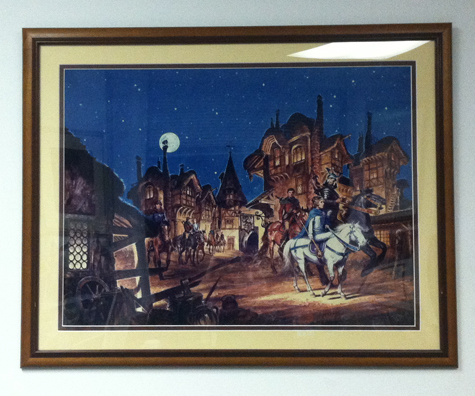
DOHERTY: Darrell Sweet was doing many of the biggest fantasies in the 1990’s.
McDOUGAL: Yes, using his work was a big expense for a little company. It was one of the ways in which you did such a superb job of publishing. Also, what’s so nice about the gorgeous Michael Whelan cover for the last book is that it’s obviously a Michael Whelan, but he very tactfully made it so that when you rack them all out, they look like family. That was a lovely thing he did.
GALLO: It is. He did a good job. The palette and compostion really works with the other covers. I didn’t envy him the job and he turned it into a nice tribute as well as a conclusion.
McDOUGAL: And Sam Weber is so nice. I keep trying to call him Sam Weller because of Dickens. He said Whelan called him once and asked: “What’s a ter’angreal?”
Looking at The Way of Kings, I had an extraordinary coincidence. A friend of mine’s former wife is a curator at the Phillips Collection in Washington. She’s a descendent of John Martin, an English painter also known as Mad Martin. He was the highest paid artist in Great Britain in the 1840’s, and then he sank into total obscurity until a couple of war refugees rediscovered and resurrected his works after World War II. One of his paintings is the cover of The Way of King, except that there’s a big pantheon where the guy is in the distance.
GALLO: I’m going to look that up.
McDOUGAL: His skies are very much like Michael Whelan’s. He was doing all that stuff way back then. I don’t know if Whelan’s ever looked at him, but it looks as if he has. Those fabulous skies of Whelan’s.
I also loved the ornaments. We worked with Matt Nielsen creating those. They were really good. The emblem that we used for the Blight is a tree, and I was trying to tell him what I needed. I said I wanted Arthur Rackham, and he said: “Who?” I said: “Well, okay, let’s try and work on this.”
GALLO: He couldn’t Google it at that point, either.
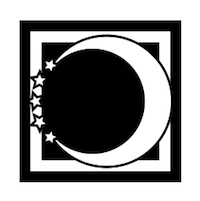
McDOUGAL: No, but he did such a good job. The fans really caught onto them, thinking about their symbolism. “What do these ornaments mean?” They did, in fact, have a bit of a coded meaning. Lanfear’s symbol means Lanfear is lurking in this chapter, even though she’s not named.
It was fun, working on those ornaments. From the beginning, I did most of the chapter titles, all but one or two each book. I was very proud when somebody told me, many years ago, that he saw a chapter titled “Footprints in Air” in the table of contents and that made him buy the book. Well, great, that’s the idea.
GALLO: Every piece of it counts. The whole package.
DOHERTY: Exactly.
McDOUGAL: I really wanted to do something we hadn’t followed through with: the Wheel of Time in front and back. Back in the twenties, there was a wonderful children’s book with a bullet hole that ran through the whole book. It was by Johnny Gruelle, who later did Raggedy Ann and Andy. It was a wonderful thing. I would have loved a book that had the Snake Wheel in the front of the book, the big one, and one in the back of the book, so you could really hold them like that to reinforce “There are neither beginnings nor endings—
DOHERTY: —in the Wheel of Time.” Practically, to do that right you would have had to put it on the end papers. We had such nice end papers.
McDOUGAL: Oh, yeah. Well, the map was more important.
DOHERTY: Exactly.
Tom Doherty has been a central figure in genre publishing for decades. He is the founder, President and Publisher of Tom Doherty Associates, which publishes books under the Tor, Forge, Orb, Tor Teen and Starscape imprints. Tor Books, which he founded more than three decades ago, has won the Locus Award for Best Publisher every single year since 1988.
Harriet McDougal is the widow of James Oliver Rigney Jr., better known to the world as Wheel of Time author Robert Jordan. She is also an accomplished editor who worked with Tom Doherty at Tempo and Ace and in the founding of Tor Books.
And that concludes this fascinating conversation between two towering figures in fantasy. Stay tuned for future installments of “Talking with Tom”!
Stefan Raets reads and reviews science fiction and fantasy whenever he isn’t distracted by less important things like eating and sleeping. You can find him on Twitter, and his website is Far Beyond Reality.










